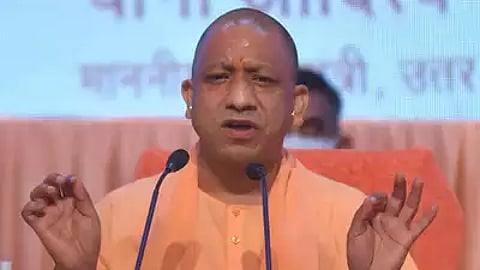
Last year, a flurry of new theories arose concerning the renaming of Lucknow, triggered by a tweet from the Chief Minister of Uttar Pradesh, Yogi Adityanath, during Prime Minister Narendra Modi's visit to the city. In his tweet, the Chief Minister greeted the Prime Minister with the words, "Welcome to the holy city of Lucknow, the holy city of Sheshavatar Lord Shri Laxman ji..." This year, BJP MP Sangam Lal amplified these speculations by calling for the city to be renamed after Laxman, and the Deputy Chief Minister Brajesh Pathak added fuel to the fire by stating that it is widely accepted that this city was once known as Lakshman Nagari.
Chief Minister Plays Safe
On Wednesday, the Chief Minister Yogi Adiyanath made an attempt to quell the rumors about renaming Lucknow by declaring that the city will retain its current name, and yet the door to the possibility of renaming it in the future remains open. The Chief Minister stated, "We don't make any announcements before renaming." Therefore, it seems that the Chief Minister has temporarily put this topic on hold, but the option of renaming the city still remains open.In light of the ongoing debate, it is appropriate for us to examine the assertions and historical foundations of the suggested name change and the current name of the city, Lucknow.
Lakshman Puri: Drawing on mythology
According to supporters of the Lakshman Puri theory, Lucknow was supposedly bestowed upon Lakshman by Rama as a gift. However, there is no evidence to support this assertion. In his book "Unkaha Lucknow," the late BJP leader and Lucknow resident Lalji Tandon noted that the city was once referred to as Laxmanpur and Laxmanvati, and later as Lucknauti and Lakhanpur. Ultimately, it came to be called Lucknow in English. Although Tandon did not provide any credible evidence to support his claims, his assertions are corroborated by the archaeologist of that time, D.P. Tiwari. Tiwari cites the Uttara Kand as evidence to infer that Lakshman crossed the Gomati river and arrived at Lakshman Tila, where the Tile Wali Masjid stands today.
Tandon's claim that the name "Lucknow" was first used during the British era falls apart upon closer examination. This is evidenced by the fact that the famous traveler Ibn Battuta, who visited during the time of Muhammad bin Tughlaq in 1333, referred to the city as "Alakhnau," as documented in the Lucknow Gazetteers. Therefore, it is clear that the name "Lucknow" had been in use for several centuries before the British arrived in India.
Muslim historians & their version
According to the 1971 Gazetteer, "some Muslim historians" believe that the Bijnore Sheikhs migrated to Lucknow in 1526 and that an engineer named Lakhna Pasi supervised the construction of the fort built by them. They also suggest that the fort was initially named Qila Lakhna and that the name gradually evolved into Lucknow. However, if Ibn Battuta's use of the word "alakhnau" or "lakhnau" to refer to the city during the reign of Muhammad bin Tughlaq in the 14th century is taken into consideration, this theory also loses its credibility.
Royal lineage of Pasi
According to the Lucknow Gazetteer of 1971, the claims of the Pasi community regarding their ancestral rule in Awadh are supported by earlier scholars such as Eliot, Crooke, and Russell. The Gazetteer cites William Howard Russell, who suggests that the Pasis were a Dravidian tribe who held a portion of Oudh prior to its conquest by the Rajputs. This gives significant weight to the Pasi community's claim to have ruled in Awadh before the arrival of the Rajputs and Muslim rulers. In summary, while the Pasi community's claim regarding the name of Lucknow may lack certainty, they provide the most substantial evidence to support their position. On the other hand, the claims of Lakshman Puri do not withstand scrutiny.
You can also join our WhatsApp group to get premium and selected news of The Mooknayak on WhatsApp. Click here to join the WhatsApp group.